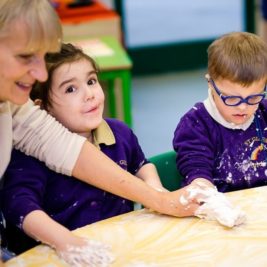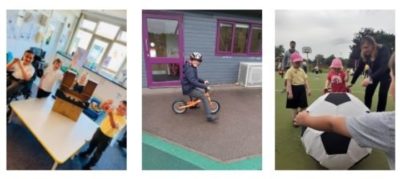St. Giles School in Derbyshire achieves the Inclusion Quality Mark’s Inclusive School Award with Flagship status for the second time.

Context
St. Giles School is a primary special school that is part of the Spencer Academy Trust. It is located in the City of Derby. It is split into two sites the Hive and the main site which is located only a few minutes away. St. Giles is the only primary special school in Derby City. The school has specialist knowledge and skills to meet the needs of pupils aged 4 to 11 years with a diverse range of Special Educational Needs and Disabilities. St Giles School is a large inclusive special school that is split across two sites. The main school site provides an education for children in Early Years (Reception), Key Stage 1 and Key Stage 2. Children’s needs on this site predominantly include severe learning difficulties, profound needs and more complex sensory needs. They may also have other associated needs including complex physical disabilities, health or care needs.
The Hive
The Hive is a satellite provision located just a 3-minute drive from the main school site. The Hive provides an education for children in Key Stage 1 and Key Stage 2. The children’s needs include moderate learning needs and other associated needs, such as high functioning ASD, Speech & Language and Social, Emotional, Mental Health Needs (SEMH). The school are firmly committed to providing every child with an exciting and personalised curriculum, which engages and fosters a ’love of learning.’ Children are motivated to become the very best they can be, both academically, emotionally and socially. The school is rightly proud of the children and see them as amazing individuals. However, the skillset, passion and humbleness of the staff in what they do, ensure the children achieve during their learning journey and prepare them for life beyond the school.
St. Giles Mission
There is nothing discreet about the inclusive practice that children and families are experiencing. As a family of schools in the Spencer Academy Trust they mission is:
‘To provide high-quality education and deliver the best possible outcomes for children and young people.’
These values of the school tie perfectly in with St. Giles mission statement which states:
‘Provide pupils with effective strategies to communicate.
Promote pupils’ independence.
Prepare pupils for life in the local and wider community.’
The conversations with the children, parents and staff are falling over themselves to reiterate this. Children and parents got emotional when talking about how the staff and leaders support them in their learning journey. One parent stated:
‘The school is always there to support.…children and families are all treated as individuals.’
The Children Excel
The school always comes back to the individual. This process focuses the school community on delivering high-quality teaching and provision that enables children to excel. The leadership team support is impressive and all leaders and staff focus on meeting the individual child’s needs and how they can work with the family to create consistency.

Staff are Happy to Support
St. Giles is a school where consistent high expectations of children have transferred into good and outstanding outcomes for all. You are constantly greeted by the staff with huge smiles, who are more than happy to support each other and share their knowledge and learn from each other. This openness and transparency from my initial meeting with the Assistant Heads at the Hive set the tone for the day and this care underpins the school. It is a very welcoming and supportive school, with a relentless determination to provide the very best education for every child both academically and holistically. Children are firmly at the centre of everything for all members of the school and support around the school, with a focus on creating a culture of success and a positive climate for learning and independence.
The School is Explicit
The school is explicit in all that it does and articulates its aims and objects clearly. The school believes that the quality of education a child receives empowers their future choices and affects their level of independence and life chances. The leaderships commitment to leading SEND practice and inclusivity is testimony to the importance of her belief that all children can achieve. Systems and practices have been put in place to support the most vulnerable children so that they have a sense of belonging, trust, and are given the skills and attributes to take ownership of their own personal development. This may be behavioural where children are able to self-direct and take themselves off and self-regulate, or academically where all children are given a personalised curriculum so that they are actively involved and take ownership in decision making in relation to their academic development. The school rightly places high importance on the mental health of both staff and children which is intrinsic to how they work within St. Giles and not seen as an ‘add on’.
Feedback is Positive
Structured teaching approaches are embedded throughout the school and autistic pupils are well supported in their communication, sensory regulation and emotional wellbeing. There is a strong commitment to empowering them to become more independent and confident in their abilities. Feedback from parents is overwhelmingly positive.
Children Enjoy Coming to School
At St. Giles, they believe in harnessing children’s unique skills across all areas of the curriculum as well as their life skills, tailoring learning to best support their future goals. This is evidenced by the values that children are not only able to articulate but also displayed in their actions around the school. One child stated:
‘The school helps us and I enjoy coming- I am able to be calm.’ The School Council are given independence and have designed the new Hive logo and their voice is being heard. For example, the formation of lunchtime clubs including the formation of a choir.’

Inspirational Leadership
Due to the systems of support built around the school children achieve extremely well from starting points. The Principal and the leadership team provides infectious and inspirational leadership. The systems, support and training for staff have created an unwavering focus on raising achievement and improving the quality of education for all children despite the barriers the children have to overcome.
The School has a Family Ethos
Leaders have an ambitious vision for providing high-quality education to all pupils. Their values of ‘create a ‘family’ ethos, having strong distributed leadership, having high expectations, celebrating all successes, is central to the shared policies and practices of the school and has contributed significantly to the school’s continuous and sustained improvement. It is not the systems and processes that make the school – it’s the dedicated leadership and passionate staff. Their open, transparent and visible leadership has built a team that expects high challenges but with a low threat. There is a culture and climate that has been created where the team learns and develops together, and they support each other. Some of the team have been at the school for many years and ‘because they are able to grow and develop staff have stayed and supported the school’. This attitude has clearly been transferred- explicitly of course, to the children! Parents strongly agreed that the school is well led and managed and stated, ‘we can ask anything from the school and they will help… they have really helped my family and my child.’
Wellbeing is Key
The family support, mental health, wellbeing and speech and language teams are highly effective, inspirational and highly valued throughout the whole school community. The communication and relationships that the teams have developed with all stakeholders is a key element in why children, families and staff are able to make progress and achieve. The contribution to the support and wellbeing of children’s families has a direct impact in supporting parents and for them tangibly see their children attain. The teams have developed relationships that enable parents to challenge themselves in believing what their child can do and with the innovative ‘Revitalising Curriculum’ are supporting children with learning difficulties to develop skills that will support them in life and their transition through education.
Leaders Adapt to all Needs
All leaders ensure that all children are successful and they are highly visible and accessible. Through their interactions with children and staff, they communicate and model high expectations of behaviour. They immediately support staff in addressing any behaviours which are not in keeping with the shared expectations and children are able to self-regulate and choose positive options. Therefore, they are able to learn to be safe, be respectful and create relationships. A great example of this was when I entered a classroom and a non-verbal child persuaded me to enter into an after-lunch yoga session to empower them to be calm and self-regulate. The difference is accepted by all children and when challenges occur staff explicitly support children in their understanding of need and adaption to meet needs.
The Importance of Transitions
The leaders of the school have recognised the importance of transitions within the school and actively praise children at every opportunity. There is a deep culture of continual self-reflection, development and improvement by understanding that behaviour is a manifestation of unmet need. The school works tirelessly in working to meet this need by having outside agencies support in the training and development of staff. This includes educational psychologists, speech and language, physiotherapy and occupational therapy to name a few. This has led to the school working alongside The City of Derby to develop a graduate response for schools within the city. This project involves supporting leaders and staff across the city in upskilling inclusion in the mainstream setting, with the intended impact being to reduce exclusion and increase SEND skill set in school to keep SEND children in their local provision. This is placing a particular challenge on the capacity of the school. However, the school has planned and already begun to implement this strategy.
There is a Secure Culture
Planning and provision are continuously monitored, adapted and changed to meet the needs of the children. Ongoing assessments scaffold children’s learning pathways and are reactive to individual needs. There is a secure culture where staff are not afraid to change the direction of learning and reshape their lessons to ensure that every child has the opportunity to be successful.
Learning Walks are Regular
Leaders carry out regular learning walks to ensure high expectations and promote inclusive learning for all. Staff praise the open-door policy which allows SLT to provide instant feedback, so staff can act rapidly to improve learner engagement and achievements. There is a culture of continuous professional development and coaching. Leaders provide day-to-day support for developing teachers’ subject, pedagogical content knowledge in order to enhance the teaching of the curriculum. There is a well-planned and structured programme of continuous professional development that is focussed and valued by staff. The school is highly reflective and provides staff with an opportunity to reflect on their practice and develop a shared understanding of effective teaching and learning. As a result, staff feel deeply involved in their own professional development, creating a climate of challenge, support and highly effective and innovative teaching.
It is a Continually Developing School
It is clear that the leadership qualities from the Principal and Senior Leadership Team have played a major role in creating such a reflective and continually developing school. Thank you for a most informative, open, inspiring and well-organised visit.
Find out more about the IQM Inclusive School Award
If your school is interested in obtaining the IQM Inclusive School Award or you wish to talk to a member of the IQM team please telephone:
028 7127 7857 (9.00 am to 5.00 pm)
or email: [email protected] for further details.
Want more information on the IQM Award? Click here to request your free IQM information pack